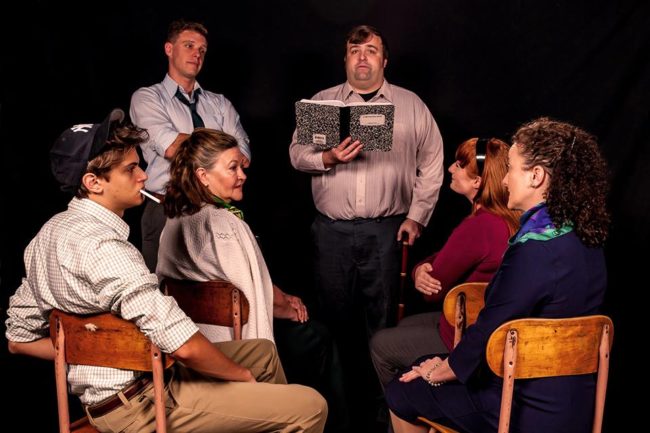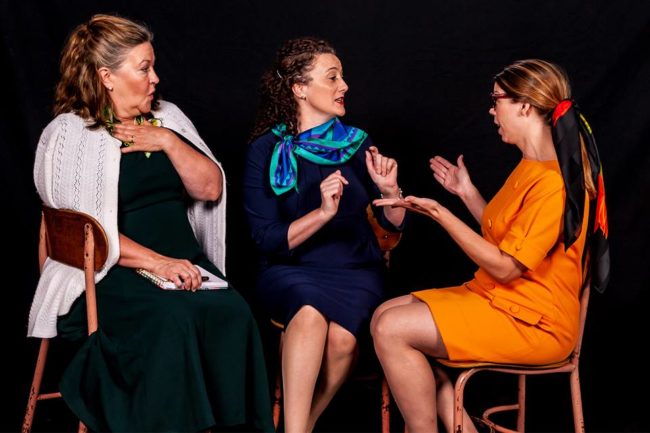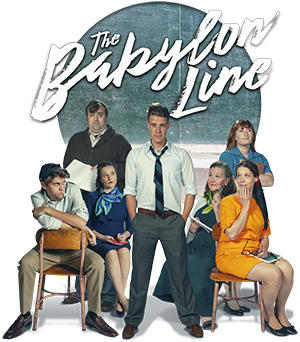How would you write your story? Would you tell the truth or a lie? Can your story change someone else or even yourself? Do you truly remember your past or is your memory altered by your perspective? So many questions to ask, a multitude of outcomes, and for a show that last 2 hours and 20 minutes plus an intermission, too much time spent unnecessarily exploring how to transmit answers. The Babylon Line by Richard Greenburg and currently being produced by The Colonial Players of Annapolis has a strong cast that does the best that they can with a show that cannot find its voice and struggles to find a conclusion to the problems proposed.

The Babylon Line is set in an adult education course on writing in Levittown, NJ in 1967. It is within this space that Richard Greenberg attempts to have each character’s story be told, yet his writing is overly wordy and never really reaches conclusions. The play revolves around six students and their writer-turned-teacher in this classroom setting. The show begins with the character Aaron Port, now 87, telling the story in present day and then transforming to a younger man in the classroom. We are introduced to the students as the gossiping housewives enter, followed by a war vet, a former valedictorian lost to the great drug of the time – marijuana, and finally a recluse of a housewife who is trying to find herself again. Each of these characters have a reason for being in the class, from wanting to learn to write to taking it because Current Affairs and French Cooking classes were full. For each of these, the struggle to write is serious and Mr. Port, their writer-turned-teacher does as much as he can to not teach, and yet get them to write. Throughout the show we learn a little about each character, but never enough to connect all the dots and understand why the story is so important for Aaron Port to tell.
The cast is led by Ron Giddings as Aaron Port. Giddings creates a believable younger Aaron Port, yet his older characterizations of Mr. Port are inconsistent at the end of the show. Giddings allows the audience to like and cheer for Mr. Port, yet at the same time enables the audience to find him sleezy for wanting to cheat on his loving wife who supports him. The 6 students in the cast, Frieda Cohen (Alicia Sweeney), Anna Cantor (Mary MacLeod), Midge Braverman (Lindsey Miller), Jack Hassenpflug (Jeff Sprague), Marc Adams (Jack Leitess), and Joan Dellamond (Robin Schwartz) do a great job as a whole to tell their stories as best as they can while struggling with their own personal demons.

MacLeod portrays Anna Cantor as the stereotypical Levittown housewife with all the troubles of trying to keep a marriage together while showing the world there are no issues. Miller as Midge Braverman shows how a character with little backstory can grow into an important part of a production by taking the little stories and scenes that she does and growing them into works of art. Sprague’s character work on Jack Hassenpflug is top-notch and his creation of physical and facial expressions makes the character believable and one to cheer on when he is struggling to work through his issues. Leitess portrays a typical struggling older teen as Marc Adams with surprising ease and humor.
The shining stars of the show though, are Robin Schwartz and Joan Dellamond and Alicia Sweeney as Frieda Cohen. Schwartz transports you through her words and monologues into the world of a childless woman struggling to be accepted in a town that is meant to have housewives with children with a husband that makes choices that create embarrassment and humiliation for her. Dellamond’s struggles are realized throughout the show as she shares her writing. Her stories are raw and real, and there is fear in her telling the truth but at the same time freedom. As Dellamond struggles to find her place, she thinks the answer to her problems is Mr. Port, but his rejection causes her setbacks while propelling her forward to her true destiny.
Alicia Sweeney spectacularly portrays Frieda Cohen. From the moment she walks in the audience wants to dislike her and love her at the same time. Sweeney portrays a nosey housewife that does not hold back and strips down the lies and fluff to review the truth on what others are saying. Sweeney’s characterization is classic and appropriate. Her reactions are real and show how by challenging both Mr. Port and Joan Dellamond she is the one truly in charge in the classroom.
The lighting design is one of the more outstanding lighting designs that I have seen in community theatre. Designer John Purnell creates appropriate moods throughout the show with subtle changes and isolation within the playing space. He delineates stories from present-day effectively and appropriately. One of the best design elements was the effects created for Mr. Port’s train ride home with lights creating the effect of the train’s movements. The sound design by David Cooper was appropriate for the show, but at times the music was too loud to hear the words being spoken on the stage. The Costumes were superb for 1967 and Beth Starnes should be credited for her hard work in selecting just the right elements and accents to make a believable setting.

The set, though appropriate for the play, was a challenge for the space and created many moments where one side of the theatre saw the backs of the heads of seated actors for long periods of time. Jennifer Cooper’s direction, which was successful in character creation, suffered in staging because of the show’s setting. This is not a fault of her or the designer, but rather an issue of the show’s writing and lack of available movement options (especially during Act I1) for a theatre in the round.
Overall, the cast, director, and crew worked hard to put together a solid show that, from the start, created challenges for them. The writing by Greenberg is wordy and drawn-out, creating moments that are too time consuming and that do not move the story along. Interest wains throughout the show and it is only the talent of the cast that reengages the audience in the story. The men and women portrayed in the show have a story to tell, the talented cast tells this story with all their might despite the writing that hinders them throughout the performance. Questions that audience members want answered never truly get answered and questions the audience never had find answers that are complex and over-analyzed. Although I did not care for the way the story was written, the acting is worth the trip down the road to see The Babylon Line at the Colonial Players of Annapolis.
Running Time: Approximately 2 hours and 45 minutes with one intermission
The Babylon Line plays through November 10, 2018 at The Colonial Players of Annapolis— 108 East Street in historic Annapolis, MD. For tickets call the box office at (410) 268-7373 or purchase them online.

